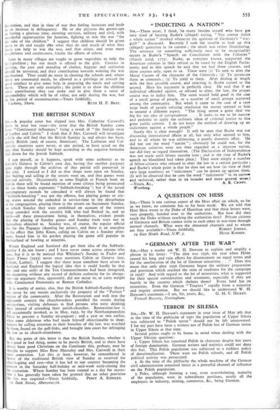THE BRITISH SUNDAY SIR, - A popular error has slipped into Mrs.
Catherine Carswell's letter in your last issue—the error that the British Sunday came from "Continental influences," being a result of "the foreign sway of Luther and Calvin." I think that if Mrs. Carswell will investigate a little she will find that the British Sunday is, and always has been, purely British (and, of course, American). The Lutheran and Cal- %inistic countries seem never, at any period, to have acted on the idea that Sunday should be kept according to the negative formulae laid down for the Jewish Sabbath.
I can myself, as it happens, speak with some authority as to Calvin's Geneva in Calvin's own day, having (for another purpose) gone right through the archives of that period still preserved in that city. I noticed as I did so that shops were open on Sunday, that buying and selling in the streets went on, and that games went forward adtively. ' Occasionally m some English or French book on Calvin there will be found mention of some citizen being prosecuted for (as these books represent) "Sabbath-breaking "; but if the actual contemporary records be consulted it will always be found that "Sabbath-'breaking" was not the offence, but playing games or cry- ing wares around the cathedral in service-time to the disturbance of the congregation, playing them in the streets on Sacrament Sunday, on which Sunday they were prohibited on account of the streets being crowded with the country folk who had flocked in, and so forth—all these prosecutions being, in themselves, evident proofs that the playing of Sunday games and Sunday trade were not in themselves objected to. Sunday was, of course, the regular official day for the Papagay (shooting for prizes), and there is an anecdote to the effect that John Knox, calling on Calvin on a Sunday after- noon, found him in his garden playing the game still popular in Switzerland of bowling at ninepins.
Where England and Scotland did get their idea of the Sabbath- Sunday I do not know ; and I have never come across anyone who does, but it is to be noticed that Whitaker's Sunday in Tudor and Stuart Times (1933) never once mentions Calvin or Geneva (nor,
I think, Luther). I suggest that there must somehow have arisen in Scotland and England the logical idea that it could hardly be that one (and one only) of the Ten Commandments had been abrogated, this occurring without any record of definite authority for its abroga- tion—an argument that, apparently, did not occur to, or carry weight with, Continental Protestants or Roman Catholics.
It is worthy of notice, also, that the British Sabbath-Sunday theory was never by any means exclusively the property of the " Puritan " section of the community. After the Restoration and well into the eighteenth century the churchwardens patrolled the streets during service-time, visiting alehouses to find persons who were drinking there instead of attending their parish-churches. Restoration-law is still occasionally invoked, as in May, 1933, by the Northamptonshire Police to prevent a Sunday air-pageant ; and a year or two earlier, when some alderman who had made himself objectionable to shop- keepers by calling attention to their breaches of the law, was watched by them, found on the golf-links, and brought into court for infringing the law as to church-attendance.
But the point of this letter is that the British Sunday, whether it be a good or bad thing, seems to be purely British, and as there have always been good Christians on the Continent this, perhaps, may be thought to support Miss Rose Macaulay and Mrs. Carswell in their main contention. Let this at least, however, be remembered in favour of the traditional British view of Sunday as reserved for church-going and rest—that it has led to our country becoming the Pioneer in the Saturday half-holiday or mid-week early-closing day for recreation. Where Sunday has been treated as a day for recrea- tion it has generally been taken for granted that no other provision






























 Previous page
Previous page